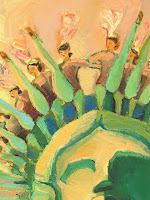Obsessed by rhetoric, I have a new body to contemplate: the review headlines that my book, Sisterhood Interrupted, have spawned in the weeks since its recent release. “Why Can’t These Mothers and Daughters Be Like Sisters?” asks the New York Observer. “Can Mothers Be Sisters?” muses the header on an interview I did over on Chicago Moms last week when I was in town. I’m fascinated with the whole mother-daughter-sister thing. Truly. And for those who haven’t, do check out Astrid Henry’s book, Not My Mother’s Sister, for more. But what interests me, really, and what I’ve been talking about on the road is this: Sisterhood is generationally interrupted, but feminism–“young” and “old”–runs strong.
Just not together.
I use the word “sisterhood” with nostalgia and a tinge of irony in the title (wasn’t ours supposed to be an ironic and self-contradictory age?!), and in the conclusion (spoiler alert?!), I talk about its limitations as an organizing metaphor for a social movement. Still, I can’t help but think a lot, these days, about sisterhood metaphorical and real. Of all the questions I’ve been asked, one of my faves was from an interviewer (Veronica Arreola) who had read my previous book, Only Child. Veronica asked me this:
Q: “Considering that you’re an only child, what does sisterhood mean to you? I have friends who are best friends with their sisters, others who rarely talk, and then others in the middle and can understand how they frame ‘sisterhood.’ I’m curious to see how someone without a sister frames it.”
I thought I’d share my response with folks here, because I’m curious how others, veterans and novices alike, those with sisters and those without, feel about the concept of sisterhood in regard to feminism these days. So here we go–here’s me:


A: As an only child, sure I idealized the idea of a sister—always wanted one—but I also saw the reality to be far more complicated. My best friend growing up was a twin, my mother’s a twin. My best friend was (and is) very close with her twin, but my mother and hers didn’t become close until mid-adulthood, and they have an older sister with whom my mom has a troubled bond. I‘ve watched these sets of sisters suffer hurt feelings and envy in addition to enviable closeness and great love. So my closest models of biological sisterhood were of this loving but tempestuous relationship.
Historically, for the women’s movement, the concept of sisterhood was powerful. But the idealized vision many had quickly erupted into something much more difficult, but, I think, far more real. Sisterhood (metaphorical or real) is not about twinship—looking into the mirror and expecting to see oneself—though sadly I think that’s sometimes what happens when you get swept up by an ideal. The word “sisterhood†today elicits an eye roll from many women under 40 (confession: myself, sometimes, included!) and particularly among a younger generation of feminists who are more conscious than their foremothers about the intensely significant difference of race in particular, but I use it in my book’s title to evoke a profound sense of lost common ground. Metaphorical sisterhood to me doesn’t necessarily mean sameness, or agreement, but rather recognizing commonalities across our differences. Solidarity. Generation is a new, salient difference, but the finger pointing going on right now (“younger women are throwbacks—they’re letting feminism down by dropping of careers, and flaunting their sexuality!†“older feminists are out of touch with our issues!â€) has reached a new low. Women across generations have lost sight of what we do share in common—namely, lack of affordable childcare, reproductive justice, access (still) to many of the nation’s top jobs, equal pay (77 cents on the male dollar!)…I could go on.
And on. But I want to hear from *you*. C’mon, sisters big and little, tell me what you think. Got sisterhood? Got a new, 21st century metaphor? A free book goes to the commentor with the best new metaphor – for reals.







